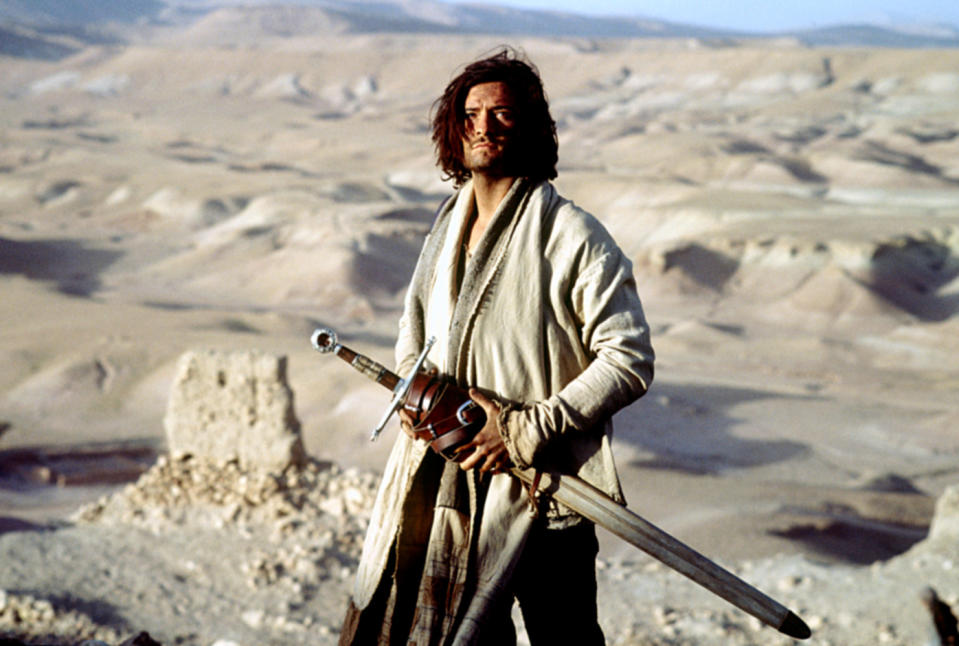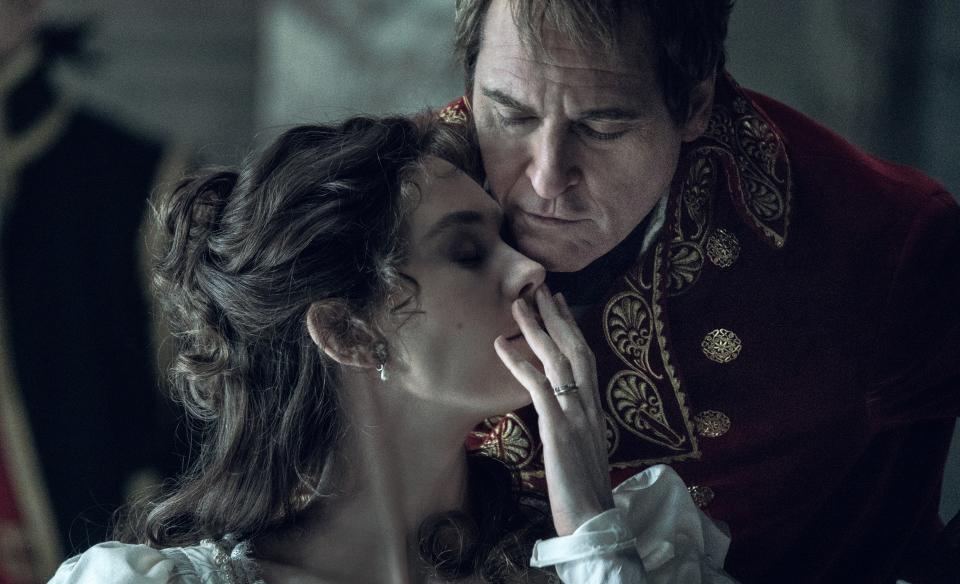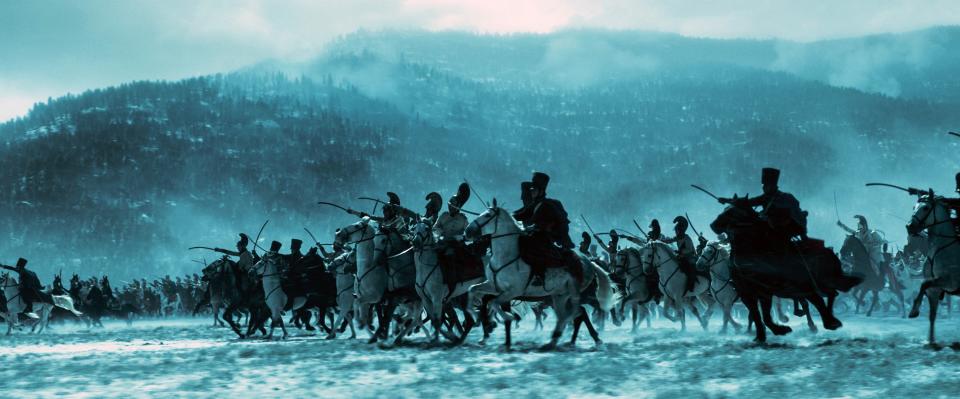‘Napoleon’ Inaccurate? Ridley Scott Has Something to Say About That: ‘Get a Life.’

- Oops!Something went wrong.Please try again later.
Ridley Scott’s “Napoleon” was revered by the British critics and scored well at the European box office, but it found a muted stateside response. (The Metascore is 64 — respectable but not stellar.) During the awards race (ballots are due January 16 at 5 PM PT), the movie scored well with crafts — but the Golden Globes nominated Joaquin Phoenix for “Beau is Afraid,” not “Napoleon.”
All of this leaves the 86-year-old filmmaker waiting a while longer to return to the Best Director circle; his fourth nomination was in 2016 for “The Martian.” He caught up with us on Zoom at his vacation home in Provence before he wraps the last few weeks of post production on “Gladiator 2,” which will be released Thanksgiving weekend. He likes to skirt around some questions.
More from IndieWire
Why the Sundance Film Festival Has to Get by with Fewer Venues This Year
'Godzilla Minus One': From Sleeper to Potential VFX Oscar Frontrunner
Anne Thompson: You’ve got to finish “Gladiator 2?”
Ridley Scott: This house belongs to a general Robert of Napoleon’s army. I didn’t know when I got it. I’ve been here 29 years. It’s a holiday house. But sometimes I do quite a lot of work and writing here. So I find it restful. No one bothers you, so you get locked down. I’ve now finished almost 85 percent of “Gladiator.” We were interrupted by the strike, so I lost four months. Otherwise, right now I’d be mixing it. I went back about four weeks ago after the strike and nearly finished before Christmas and I’ve got to go back 10 days to finish. It’s a real pain.
So 23 years after the first “Gladiator,” are we taking up 23 years later?
Ridley Scott: Without giving away too much of the plot, the word is out. It really boils down to whatever happened to Lucius [Spencer Treat Clark]. Lucius was the survivor of the first one, which people forgot, fortunately. Lucius was the son of Lucilla; he disappeared at the end because there’s no reason to follow him. And we utilize that as a device to say what happened and where did we go next?
The actor is Paul Mescal.
Ridley Scott: Yes. I got lucky. I happened to be watching “Normal People.” And I thought, “Who is this guy?” So I got lucky. He’s got what it takes.
We didn’t know that he was an athletic, muscular guy.
Ridley Scott: No, I did. He used to play Irish rugby, which is about as violent as it gets.
Can you tell me why the British critics liked “Napoleon” so much better than everyone else? They wrote raves.
Ridley Scott: We just passed $200 million, so we’re doing all right. I don’t pay attention to reviews. The only reviews I pay attention to are my own. If you’re a painter, your only real review is yourself. You’re by yourself doing a painting [and] at the end of it, you stop painting because you’re finished. I was trained as a painter, then a graphic designer, at the Royal College of Art. I decided I couldn’t stand the loneliness of a studio all by myself; I needed to have a target. With graphic design and photography, you have a brief and you have to answer the question of what to do and how to do it. You can go off and make a film for yourself, which will be a small indie movie. I made an indie movie [in 1977] called “The Duellists,” which got me a prize at Cannes. That got me in. I was off and running quick.
With “Napoleon,” were you planning to make it as a smaller movie? And were you shocked when Apple gave you the big money?

Ridley Scott: Yeah, I’m used to big money. I take my hat off to Apple for being courageous enough to take on one historic drama. What happened to the intelligent audience? Superheroes have taken the place of some of the historical dramas, right? Really? So from time to time I will do a historical film like “Kingdom of Heaven.” It was shot in Morocco. They thought I was going to run down the Muslims, but the film was in support of this Muslim Balian de Ibelin [Orlando Bloom], who was a hero in anybody’s country. It’s fantastic. “Napoleon” has to be big because of who he was and what he did. And he’s comparable, honestly, to even Alexander the Great, when you look at what he covered, and what he got, what he accomplished.
You filmed “Napoleon” in 64 days.
Ridley Scott: It would normally be about 120, but I like to use multicam because it helps me and it gives the actors freedom. That’s the big deal — eight cameras allows for things to go off the rails and get better than that which was written. The three and a half hour [version] encompasses everything. You don’t want length, you want dynamics. You want the story in the book, the narrative to work as a good dynamic. When it’s long, it’s simply long. There’s a couple of films out this year, which were simply too long for the material. You just get bored.
When your “Gladiator” star Joaquin Phoenix arrived on the Napoleon set, was he spontaneously changing things?
Ridley Scott: When I was coming to do “Gladiator,” I thought, “All the usual handsome princes are wrong.” I said, ‘No, I don’t want that.” I kept thinking about Joaquin. So I had a bit of a fight with the studio and the money to have Joaquin play the emperor, but it was the perfect choice. [Scott produced the 1998 dark comedy “Clay Pigeons,” which starred Phoenix and Vince Vaughn.] I know what he can do, so we always maintain a relationship. So I test him out saying, “I’m thinking about doing ‘Napoleon,’ what do you think?” He said, something like “yum, yum.” That was it.
He’s known for improvising on set.
Ridley Scott: I’m known for it because I do eight cameras; that allows improvisation. When you have one camera, you have to say “cut,” you’re going off-course. When I have eight, I’m planning for improvisation. I do eight to 11 cameras on every movement.
So what did he bring to that character? Beyond the script.
Ridley Scott: I have to make the “Napoleon” statement that goes on paper. Then he reads it and has to say “yes.” Before you even get near the floor, in my office, we sat there for a month, literally going through everything.
I interviewed your writer David Scarpa and he prefers the short version to the long version of your movie.

Ridley Scott: You haven’t seen the long version? So how can you say that?
How long is it? Three and a half hours?
Ridley Scott: The longer version is three and a half hours. Every cut is always longer. When you’re cutting and showing you watch the 3:45, the 3:30. And I like the 3:30 cut. Except, one has to take into account when films are running 3:30 in the theater. Now I’m running 13,000 screens in a theater, I have to be responsible, I’m very aware, and conscious of the budget I’m given, I’m responsible to that budget.
So Josephine (Vanessa Kirby) gets more time in the longer version?
Ridley Scott: A little bit of everything, but Josephine certainly has more time in prison. We explain who she was and how she came back. The short haircut came about because in prison, the women cut their hair because the guillotine is like Velcro on hair. The guillotine hitting her can actually be stopped. So if you’re going to get guillotined, you want to the head to come off with one stroke. You do not want three. So they all cut their hair, all knowing fatalistically they’re just destined for guillotine.
The most revealing thing was the vulnerability of Naopleon’s letters to Josephine. His letters were almost juvenile in their sexuality. He adores her, come what may. He left his army in Egypt because she was playing around in Paris. That’s true. And he never went back. So half his army was left behind in Egypt, so they just stayed. He abandoned them.
How did you decide which battles you were going to do? You always keep it clear. You always show us exactly what we need to know.

Ridley Scott: There were 66 battles. We choose those which, first of all, were the milestones within the context of the three acts and his evolution. One of the most spectacularly well-planned chess games was Austerlitz. It was on the lake in the ice. He strategically chose it knowing where the Austria-Russian army were. He choose a spot around this massive lake about 12 kilometers away. He chose a stone village on the edge of the lake, which is a fisherman’s village. The Russians are used to a wooden waffle where bullets will fly through. Stone becomes a castle, so you lower the appearance of 4,000 men in tents there. Whether the Russians or Cossacks had scouts, he knew he would be spotted. That’s what he wants. You’re going to push them onto the lake, and then they’re going to camp on the lake.
The stunning shots of cannonballs and horses plunging through the ice into the lake were digital effects.
Ridley Scott: Well, the lake was an airfield. And the wood where he was, we blended the woodland and its hill, so it has a vantage point looking down onto the airfield by blending the airfield onto the wood.
You made Waterloo look very different.
Ridley Scott: Waterloo was two miles apart, which is bizarre. So the horses had to get some mileage to meet in the middle. My battlefield was about 800 meters, just nearly a mile. So Waterloo was spread out, right? Wellington was a great study, he had studied Napoleon’s tactics: “He cannot help himself, he has to go into the field.” So you watch him come onto the field.
People have said that the movie wasn’t accurate. Does it matter? Do you care?
Ridley Scott: I said, “Get a life.” But let me add to that. There’s 2,400 books written about Napoleon. That’s one book for every week of his life. You’re telling me that 2,300 are accurate? Give me a break. The danger about writers is they tend to think about the importance of how good their writing is.
Why was it so hard to get other Napoleon movies made? Abel Gance managed it. Kubrick didn’t.

Ridley Scott: When Stanley died, I got the “Bonaparte” script from his estate because I used to talk to him from time to time. But the script was, as you would expect, from birth to death. He started to make the whole thing for two and a half years editing. That was his way: He’d find the solution out of miles of footage from every part of the story. Sergei Bondarchuk decided to do “Napoleon” [in 1971]. I didn’t like the Bondarchuk version, because they only took the part in his later days where he appeared to be out of his mind throughout the whole movie, which became exhausting. That was a bad decision. Right? They had a Russian army and 100,000 troops. They were real. Wow. There’s the Abel Gance [1927], in black-and-white, which is a marvelous pictorial triptych done to music.
I tried to make “Napoleon” accessible. By concentrating the eye on his fragility, on his Achilles heel, that was my choice. I wanted to not so much make it about wars, but about why this man who was so powerful, was so vulnerable with this woman. And it’s got to go beyond the bedroom. The bedroom wears out. It has to be something else in his psyche. He was deeply, passionately involved, in love with her forever, from the moment he set eyes on her. When she becomes the Empress of France, then she has to start paying attention to him.
Are you in a hurry to get many things done? Are you feeling like you need to keep moving?
Ridley Scott: I have been in my career. I’ve done about 200 TV shows, but I’ve done about 30 quite large movies myself. I just love to work. I’m sitting in my vineyard right now. I’ve had this 29 years. And so I make wine as well. It’s just who I am.
Best of IndieWire
2023 Emmy Predictions: Who Will Win at the Primetime Emmy Awards?
2023 Emmy Predictions: Outstanding Documentary or Nonfiction Special
2023 Emmy Predictions: Outstanding Documentary or Nonfiction Series
Sign up for Indiewire's Newsletter. For the latest news, follow us on Facebook, Twitter, and Instagram.

